
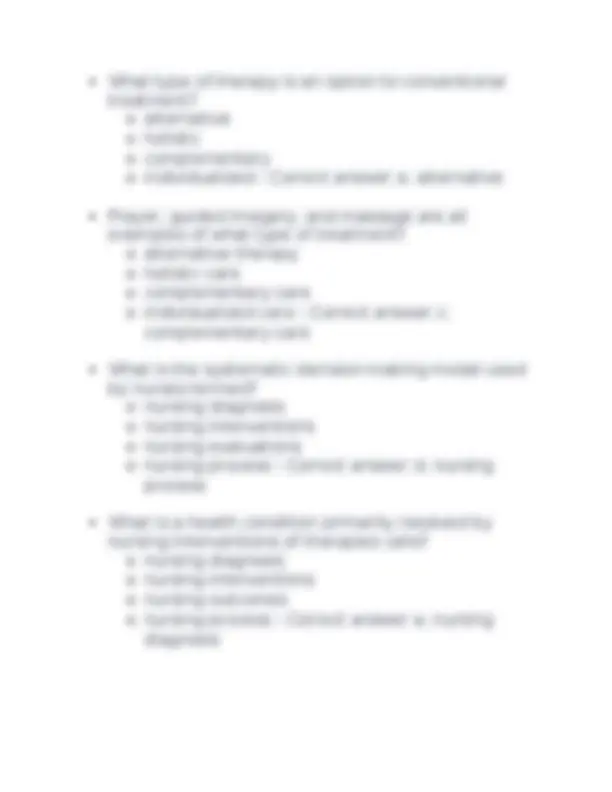
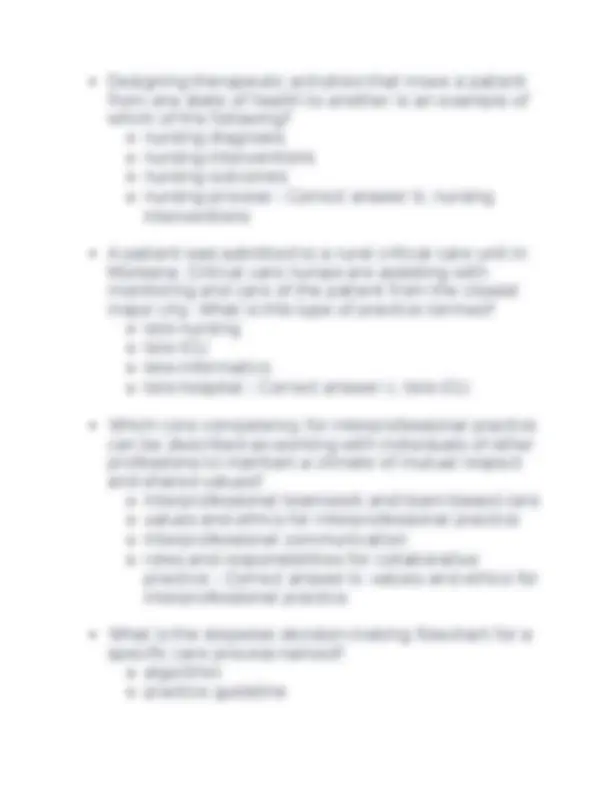
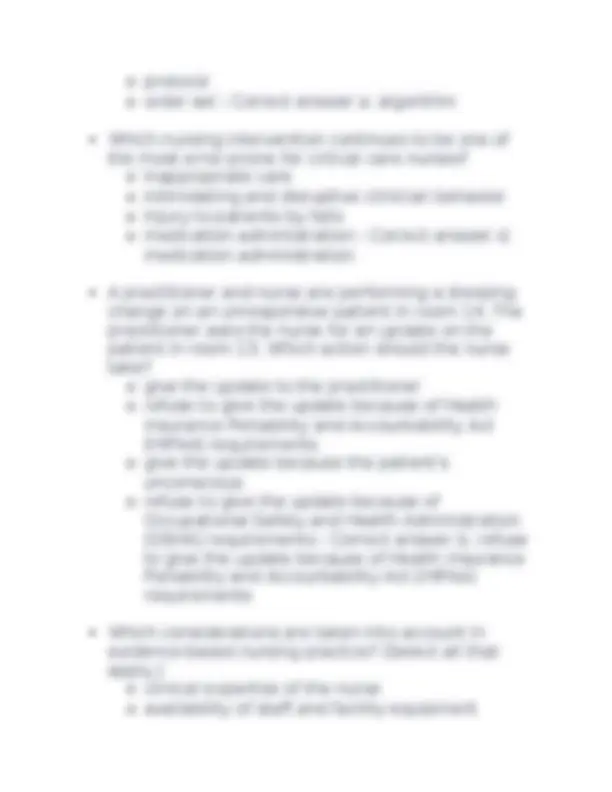
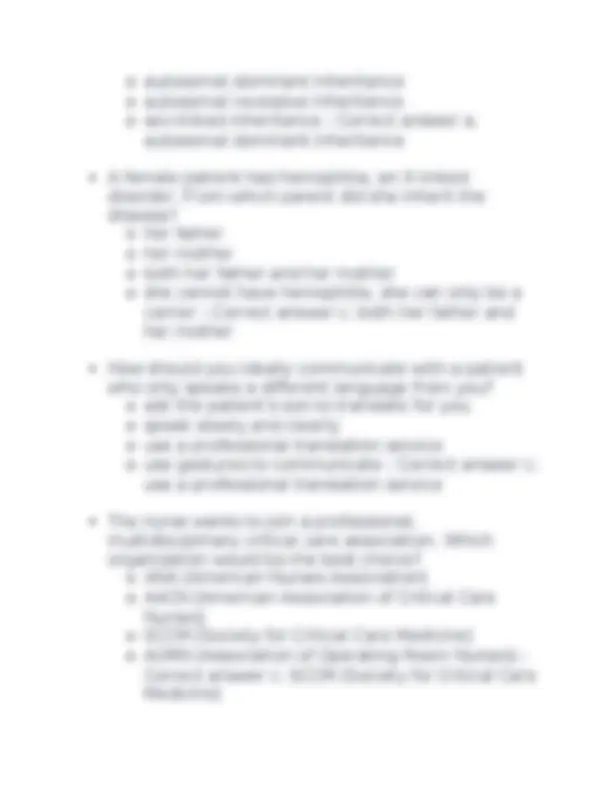
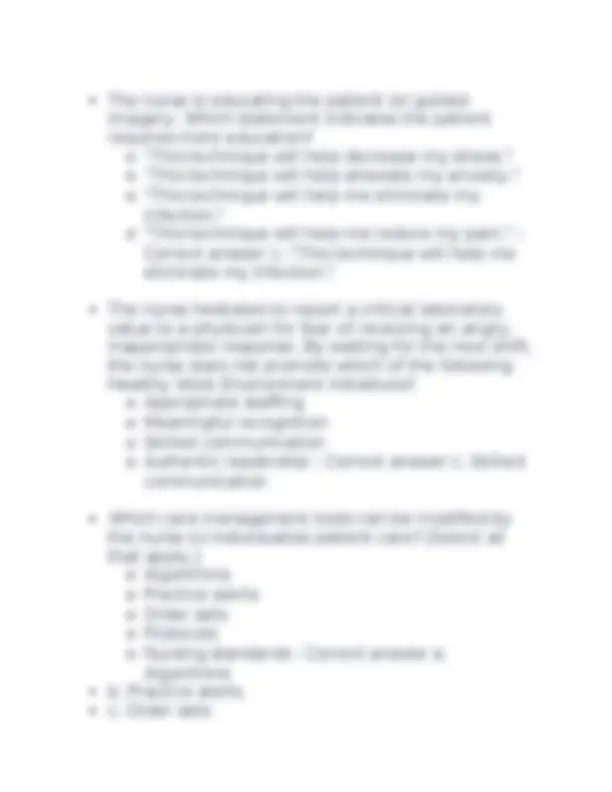
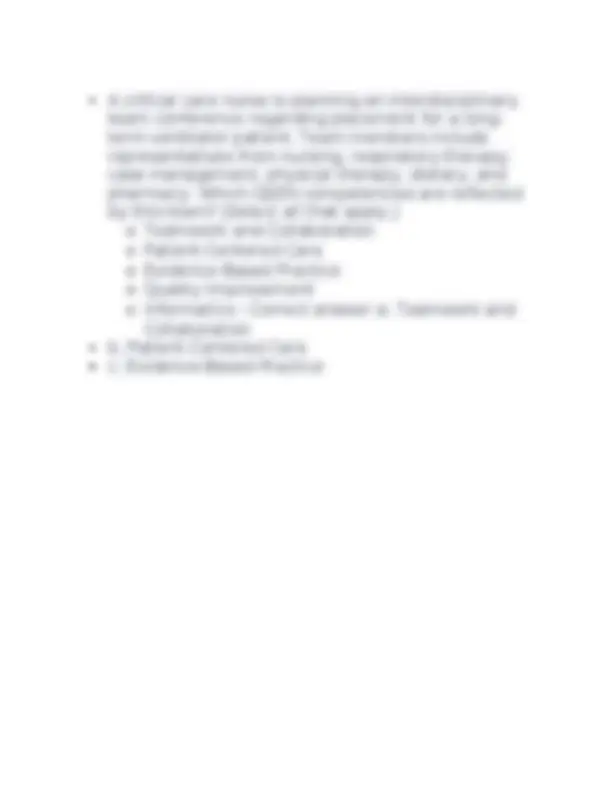


Study with the several resources on Docsity

Earn points by helping other students or get them with a premium plan


Prepare for your exams
Study with the several resources on Docsity

Earn points to download
Earn points by helping other students or get them with a premium plan
Community
Ask the community for help and clear up your study doubts
Discover the best universities in your country according to Docsity users
Free resources
Download our free guides on studying techniques, anxiety management strategies, and thesis advice from Docsity tutors
Critical care nursing exam questions and answers, covering topics such as shock wards during world war ii, advanced practice nurses, clinical nurse specialists, critical care certification exams, holistic care, alternative therapy, and more. Useful for university students and lifelong learners preparing for exams or quizzes.
Typology: Exams
1 / 10

This page cannot be seen from the preview
Don't miss anything!







During World War II, what type of wards were developed to care for critically injured patients? o intensive care o triage o shock o postoperative - Correct answer c. shock What type of practitioner has a broad depth of specialty knowledge and expertise and manages complex clinical and system issues? o registered nurses o advanced practice nurses o clinical nurse leaders o intensivits - Correct answer b. advanced practice nurses What type of practitioner is instrumental in ensuring care that is evidence based and that safety programs are in place? o clinical nurse specialist
o advanced practice nurse o registered nurse o nurse practitioners - Correct answer a. clinical nurse specialist Which professional organization administers critical care certification exams for registered nurses? o State Board of Registered Nurses o National Association of Clinical Nurse Specialist o Society of Critical Care Medicine o American Association of Critical-Care Nurses - Correct answer d. American Association of Critical-Care Nurses Emphasis is on human integrity and stresses the theory that the body, mind, and spirit are interdependent and inseparable. This statement describes which methodology of care? o holistic care o individualized care o cultural care o interdisciplinary care - Correct answer a. holistic care The American Association of Critical-Care Nurses (AACN) has developed short directives that can be used as quick references for clinical use that are known as o critical care protocol o practice policies o evidence-based research o practice alerts - Correct answer d. practice alerts
Designing therapeutic activities that move a patient from one state of health to another is an example of which of the following? o nursing diagnosis o nursing interventions o nursing outcomes o nursing process - Correct answer b. nursing interventions A patient was admitted to a rural critical care unit in Montana. Critical care nurses are assisting with monitoring and care of the patient from the closest major city. What is this type of practice termed? o tele-nursing o tele-ICU o tele-informatics o tele-hospital - Correct answer c. tele-ICU Which core competency for interprofessional practice can be described as working with individuals of other professions to maintain a climate of mutual respect and shared values? o interprofessional teamwork and team-based care o values and ethics for interprofessional practice o interprofessional communication o roles and responsibilities for collaborative practice - Correct answer b. values and ethics for interprofessional practice What is the stepwise decision-making flowchart for a specific care process named? o algorithm o practice guideline
o protocol o order set - Correct answer a. algorithm Which nursing intervention continues to be one of the most error-prone for critical care nurses? o inappropriate care o intimidating and disruptive clinician behavior o injury to patients by falls o medication administration - Correct answer d. medication administration A practitioner and nurse are performing a dressing change on an unresponsive patient in room 14. The practitioner asks the nurse for an update on the patient in room 13. Which action should the nurse take? o give the update to the practitioner o refuse to give the update because of Health Insurance Portability and Accountability Act (HIPAA) requirements o give the update because the patient's unconscious o refuse to give the update because of Occupational Safety and Health Administration (OSHA) requirements - Correct answer b. refuse to give the update because of Health Insurance Portability and Accountability Act (HIPAA) requirements Which considerations are taken into account in evidence-based nursing practice? (Select all that apply.) o clinical expertise of the nurse o availability of staff and facility equipment
professionals - Correct answer a. respecting the values, beliefs, and rights of the patient b. intervening when the best interest of the patient is in question c. helping the patient obtain necessary care e. monitoring and safeguarding the quality of care the patient receives According to Kupperschmidt, what factors are needed to become a skilled communicater? (Select all that apply.) o becoming candid o becoming reflective o setting goals o surveying the team o becoming aware of self-deception - Correct answer a. becoming candid b. becoming reflective e. becoming aware of self-deception A patient uses guided imagery and massage along with analgesics for pain management. This is an example of the use of which kind of therapy? (Select all that apply.) o alternative therapy o conventional therapy o complementary therapy o intermediate therapy - Correct answer b. conventional therapy c. complementary therapy A female patient has Marfan Syndrome. The patient's father also had the syndrome, but the mother did not. What mode of inheritance is responsible?
o autosomal dominant inheritance o autosomal recessive inheritance o sex-linked inheritance - Correct answer a. autosomal dominant inheritance A female patient has hemophilia, an X-linked disorder. From which parent did she inherit the disease? o her father o her mother o both her father and her mother o she cannot have hemophilia, she can only be a carrier - Correct answer c. both her father and her mother How should you ideally communicate with a patient who only speaks a different language from you? o ask the patient's son to translate for you o speak slowly and clearly o use a professional translation service o use gestures to communicate - Correct answer c. use a professional translation service The nurse wants to join a professional, multidisciplinary critical care association. Which organization would be the best choice? o ANA (American Nurses Association) o AACN (American Association of Critical Care Nurses) o SCCM (Society for Critical Care Medicine) o AORN (Association of Operating Room Nurses) - Correct answer c. SCCM (Society for Critical Care Medicine)
A critical care nurse is planning an interdisciplinary team conference regarding placement for a long- term ventilator patient. Team members include representatives from nursing, respiratory therapy, case management, physical therapy, dietary, and pharmacy. Which QSEN competencies are reflected by this team? (Select all that apply.) o Teamwork and Collaboration o Patient-Centered Care o Evidence-Based Practice o Quality Improvement o Informatics - Correct answer a. Teamwork and Collaboration b. Patient-Centered Care c. Evidence-Based Practice